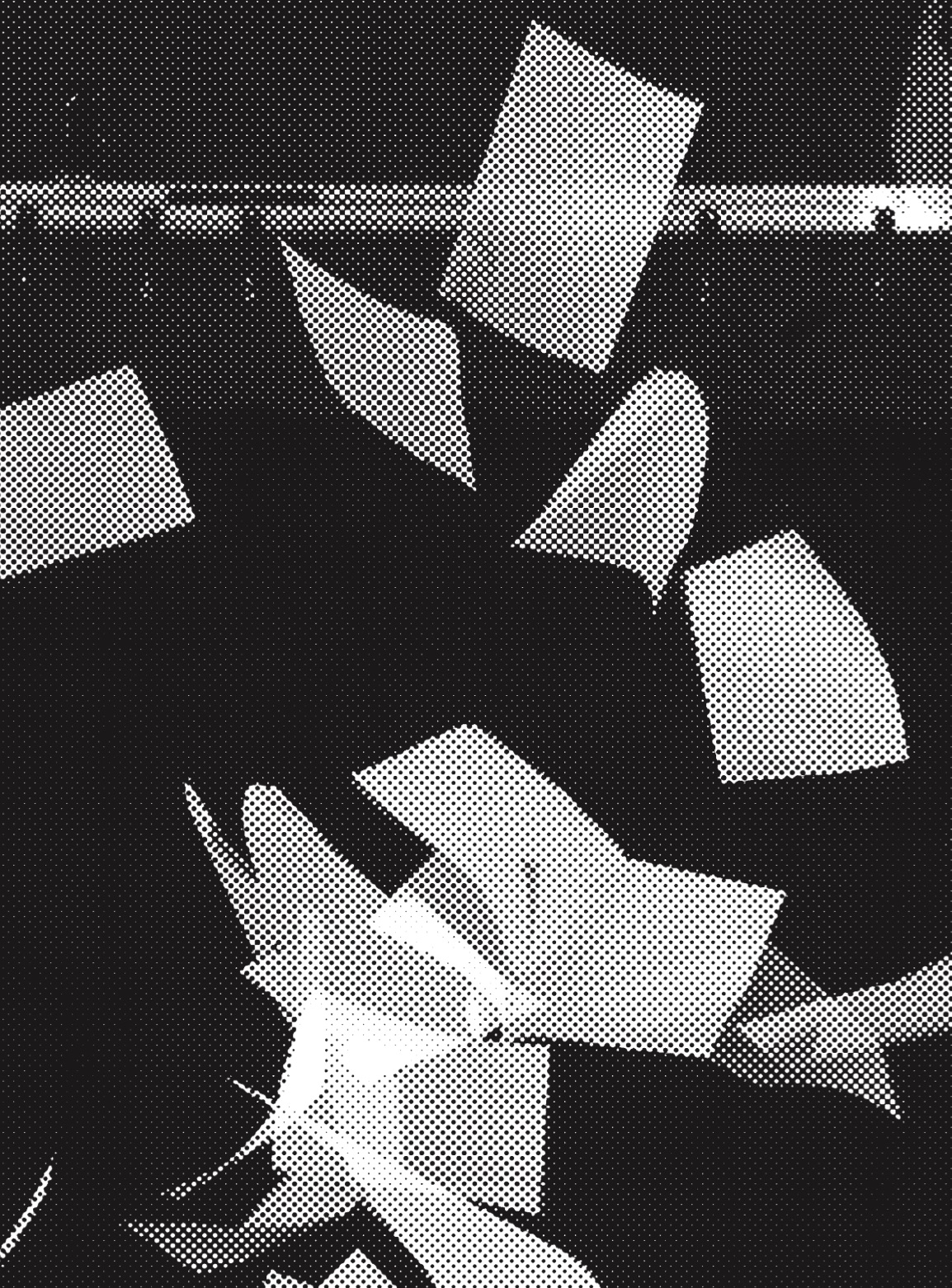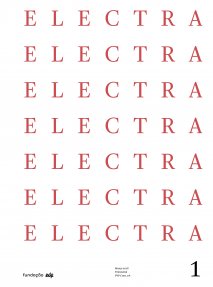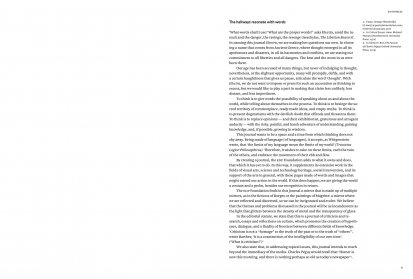Our age has been accused of many things, but never of indulging in thought; nevertheless, at the slightest opportunity, many will promptly, deftly, and with a certain haughtiness that gives us pause, articulate the word ‘thought’. With Electra, we do not want to impose or press for such an accusation as thinking to excess, but we would like to play a part in making that claim less unlikely, less distant, and less impertinent.
To think is to give words the possibility of speaking about us and about the world, while telling about themselves in the process. To think is to besiege the sacred territory of commonplace, ready-made ideas, and empty truths. To think is to present dogmatisms with the devilish doubt that offends and threatens them. To think is to replace opinions — and their exhibitionist, gratuitous and arrogant audacity — with the risky, painful, and harsh adventure of understanding, gaining knowledge, and, if possible, growing in wisdom.
This journal wants to be a space and a time from which thinking does not shy away. Being made of language (of languages), it accepts, as Wittgenstein wrote, that ‘the limits of my language mean the limits of my world’ (Tractatus Logico-Philosophicus). Therefore, it wishes to take on these limits, each the twin of the others, and embrace the movement of their ebb and flow.
By creating a journal, the EDP Foundation adds to what it owns and does, that which it has yet to do. In this way, it supplements its extensive work in the fields of visual arts, science and technology heritage, social intervention, and its support of the arts in general, with these pages made of words and images that might extend our action in the world. If this does happen, we are giving the world a contact and a probe, besides our recognition in return.
The EDP Foundation finds in this journal a mirror that is made up of multiple mirrors, as in the fictions of Borges or the paintings of Magritte: a mirror where we are reflected and discerned, so we can be invigorated and evolve. We believe that the themes and problems discussed in the journal will be as incandescent as the light that glitters between the density of metal and the transparency of glass.
In the editorial statute, we state that this is a journal of criticism and research, essays and reflections on culture, which promotes the creation of hypotheses, dialogue, and a fluidity of frontiers between different fields of knowledge. ‘Criticism is not a “homage” to the truth of the past or to the truth of “others”’, wrote Barthes; ‘it is a construction of the intelligibility of our own time’. (‘What is criticism?’)
We also state that, in addressing topical issues, this journal intends to reach beyond the immediacy of the media. Charles Péguy would recall that ‘Homer is new this morning, and there is nothing perhaps so old as today’s newspaper’.
The journal enquires into the spirit of the age — into the trends, the ideas, the images, and mythologies that shape our times and set them in motion. This enquiring attitude analyses, interprets, imposes and exposes complexities, gauges and confronts alternatives.
Electra is both form and content, and it aspires to the mutable and supple coincidence of the two. It is a journal to be read and seen. It is a contemporary quarterly — from the design that shapes it, and the images that make it, to the features that reroute it along other paths, which are also its own.
On the other hand, as a journal, it does not forget the answer given by the philosopher Giorgio Agamben to the question ‘What is the contemporary?’ — ‘Those who are truly contemporary, who truly belong to their time, are those who neither perfectly coincide with it nor adjust themselves to its demands. They are thus in this sense irrelevant. But precisely because of this condition, precisely through this disconnection and this anachronism, they are more capable than others of perceiving and grasping their own time. […] Contemporariness is, then, a singular relationship with one’s own time, which adheres to it and, at the same time, keeps a distance from it. More precisely, it is that relationship with time that adheres to it through a disjunction and an anachronism. Those who coincide too well with the epoch, those who are perfectly tied to it in every respect, are not contemporaries, precisely because they do not manage to see it; they are not able to firmly hold their gaze at it’.
Electra aims to view the world with intention, attention, and tension. It aims to do so through various instruments with which it focuses, fixes, shifts, scrutinizes, widens, weighs, measures, and distances itself. And also indicates, shows, hides, generalizes, particularises, speculates, experiments, demonstrates, and argues. Perhaps we can also say of this journal (as Boris Groys says of art in his interview) that it manifests the way in which it wants the world to see it.
Michel Foucault wrote: ‘There are times in life when the question of knowing if one can think differently than one thinks, and perceive differently than one sees, is absolutely necessary if one is to go on looking and reflecting at all. [...] What is philosophy today — philosophical activity, I mean — if it is not the critical work that thought brings to bear on itself? In what does it consist, if not in the endeavour to know how and to what extent it might be possible to think differently, instead of legitimating what is already known?’ (The Use of Pleasure) These questions are already the beginning of an answer, and this journal wishes to raise them as well. To think is also to give words the possibility of refusing to say what does not apply to them.
Electra has the most diverse and pluralist group of contributors possible to suit its topics. We try to dispense with borders when inviting an author. There is only one rule: to invite the best, wherever they are, to think and write what needs to be thought and written on a given subject, in a given moment. By appealing to contributions from so many fields of knowledge, experiences, geographies, affiliations, institutions, hierarchies, anarchies, and horizons, we signal our yearning to know, to think, and to say.
The editor of Electra is the journalist, critic, and essayist António Guerreiro. His solid experience and intellectual stance will ensure the journal’s insight, profundity, and rigour.
The designer is João M. Machado. His project was selected from among fifteen high-quality proposals. We chose a ‘graphic idea’ that combines clarity with efficiency, and elegance with accuracy.
The editorial advisor is João Brito, who combines his knowledge of the matter with many other competencies, turning them into an arrow aimed at the target.
We gratefully acknowledge the contributions of those who have put their trust in us — a trust we received as the best proof that Electra can be a voice that spreads the word.
Published in two volumes, and two languages, Portuguese and English, Electra means to travel every path to where nothing should prevent us from being there.
In this first issue, we present the key sections of the journal: its matrix and its code, its themes and motifs, its form and its formula, its physiognomy and its rhythm, its anatomy and its physiology, its algebra and its grammar.
As we focus our attention on these great times, and choose it as Electra’s first ‘Subject’, we say what we are, and what we are going to be; we say where we are, and point to the beyond of what is near. This inaugural issue is the epigraph to other issues, a chessboard ready for the game to begin, a wave cast in the sea of time
Nevertheless, it is also the opposite of self-sufficiency, and the confirmation of disaffection. We hope that, while being what they are, all issues can be the first of the ones to follow, and the last of the preceding ones.
Electra is not an academic journal, nor a professional or technical journal. It is not a general news magazine. It is not a messianic, salvific, or redemptive journal. It does not chase events. Instead, it is situated between thinking those events and the event of thinking. We invite the readers to have this journal at hand — that hand which, as they wake up, rubs their eyes so they can see better, more clearly, and more sharply.
We hope that the words in this journal would not topple over each other, as it happens sometimes with the ruins that those words name. We hope that it will never be like the music that stops, the breathless air, the voice that fails. We would like it to be the flowing current, the plumb line, and the rising spear. We would like the readers to take hold of it as they would take hold of something they miss and their desire recognizes and attracts. We would like the readers to be the best messengers of the journal, its interlocutors and its critics: those who utter the words that respond to our word, and from whom we receive the gaze that meets our own and prolongs it.
Electra is the name of the woman who raised her voice to ask, ‘what words shall I use? What are the proper words?’ (As Electra, the journal, will do in every issue.) The name sounds like the paronymous word that announces movement and current, conduction, energy. Electra is also the one who, symmetrical with Oedipus, gave name to what inside the human soul builds us as a belief.
From Aeschylus to Euripides and Sophocles, from Hugo von Hofmannsthal, Richard Stauss, Eugene O’Neill, and Jean Giradoux to Marguerite Yourcenar, J. P. Sartre, T. S. Eliot, and Theodorakis, the name Electra is an axis around which many moving and mutable worlds revolve.
In the final lines of one of the two poems in which she evokes Electra, the poet Sophia de Mello Breyner Andresen writes:






Share article